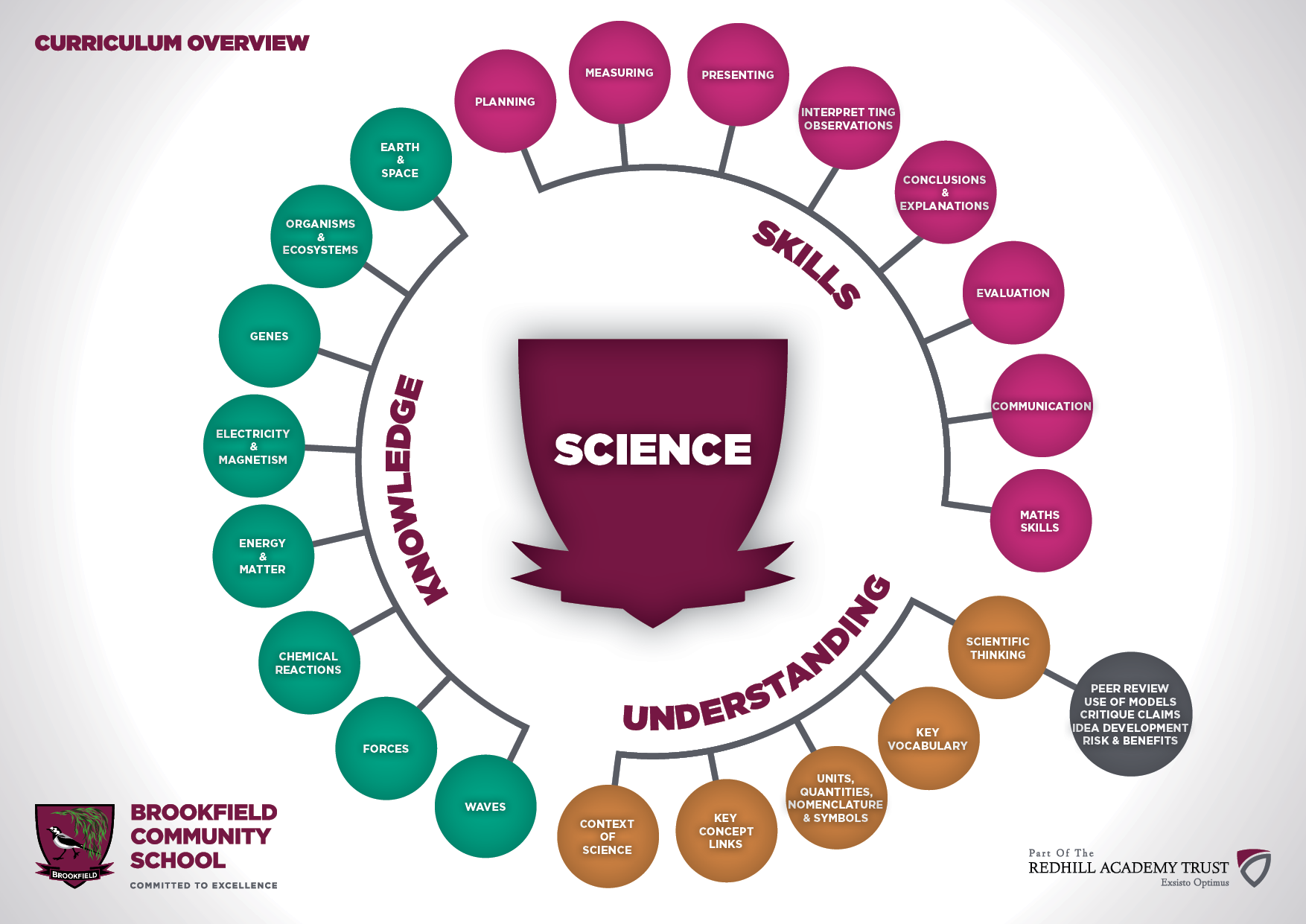Science
Click image to view full size.
Introduction to Science
Our intent is to deliver an inspiring and memorable Science curriculum. We aim to provide a challenging, productive, safe and enjoyable working environment. Students will experience a balance of activities within the curriculum, which cover aspects of Biology, Chemistry, Physics and the scientific process. As the students move through the courses, they are accumulating the knowledge and skills necessary for academic success whilst fostering an interest in Science and its role in the world around us.
Key Stage 3
The students study three lessons a week of Science. Each year group is split into two halves, within each half year there are three classes. There are some aspects of setting in each half year with one faster working class and two mixed classes of students. The students cover the Key Stage Three National Curriculum for Science which give students a broad experience of all three disciplines within the Science subject. There is also scope for our students to develop their science investigative skills across the three years of Key Stage Three. Science is the systematic study of the physical and natural world.
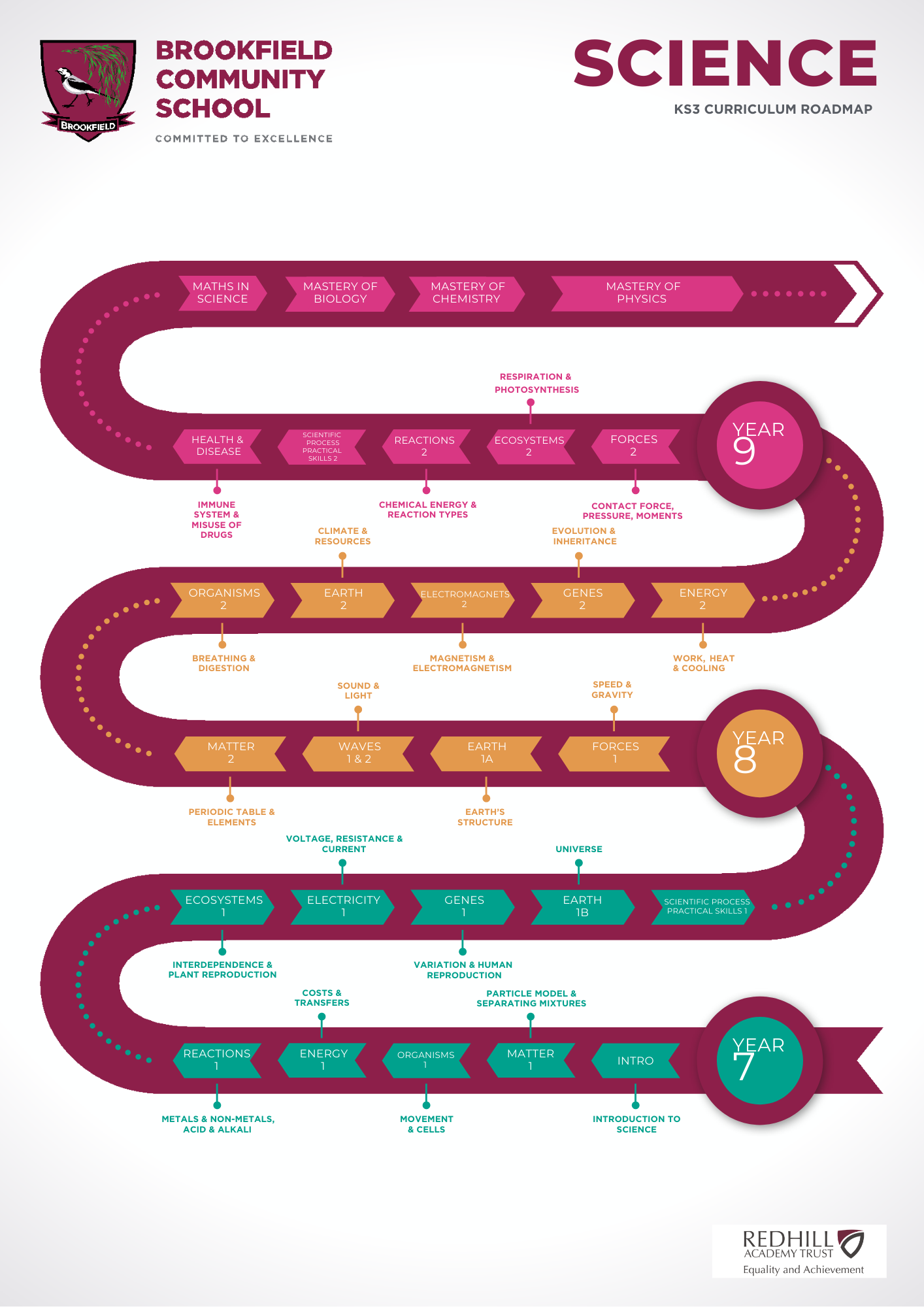
Key Stage 4
GCSE Combined Science (Trilogy)
Exam Board: AQA
The Course
Teaching in science in Key Stage 4 continues with the process of building upon and deepening scientific knowledge and the understanding of ideas developed in earlier key stages in the subject disciplines of biology, chemistry and physics.
Science is the systematic study of the physical and natural world through observation and experimentation.
Science is changing our lives and is vital to the world’s future prosperity, all students need to be taught essential aspects of the knowledge, methods, processes and uses of science.
The Biology topics covered are;
- Experimental skills
- Cell biology
- Organisation
- Infection and response
- Bioenergetics
- Homeostasis and response
- Inheritance, variation and evolution
- Ecology
The Chemistry topics covered are;
- Experimental skills
- Atomic structure and the periodic table
- Bonding, structure, and the properties of matter
- Quantitative chemistry
- Chemical changes
- Energy changes
- The rate and extent of chemical change
- Organic chemistry
- Chemical analysis
- Chemistry of the atmosphere
- Using resources
The Physics topics covered are;
- Experimental skills
- Energy
- Electricity
- Particle model of matter
- Atomic structure
- Forces
- Waves
- Magnetism and electromagnetism
How are students assessed?
There are six exam papers: two biology, two chemistry and two physics. All the exam papers are 1 hour and 15 min long and account for 16.7% of the final mark. Questions can be multiple choice, structured, closed short answer, and open response.
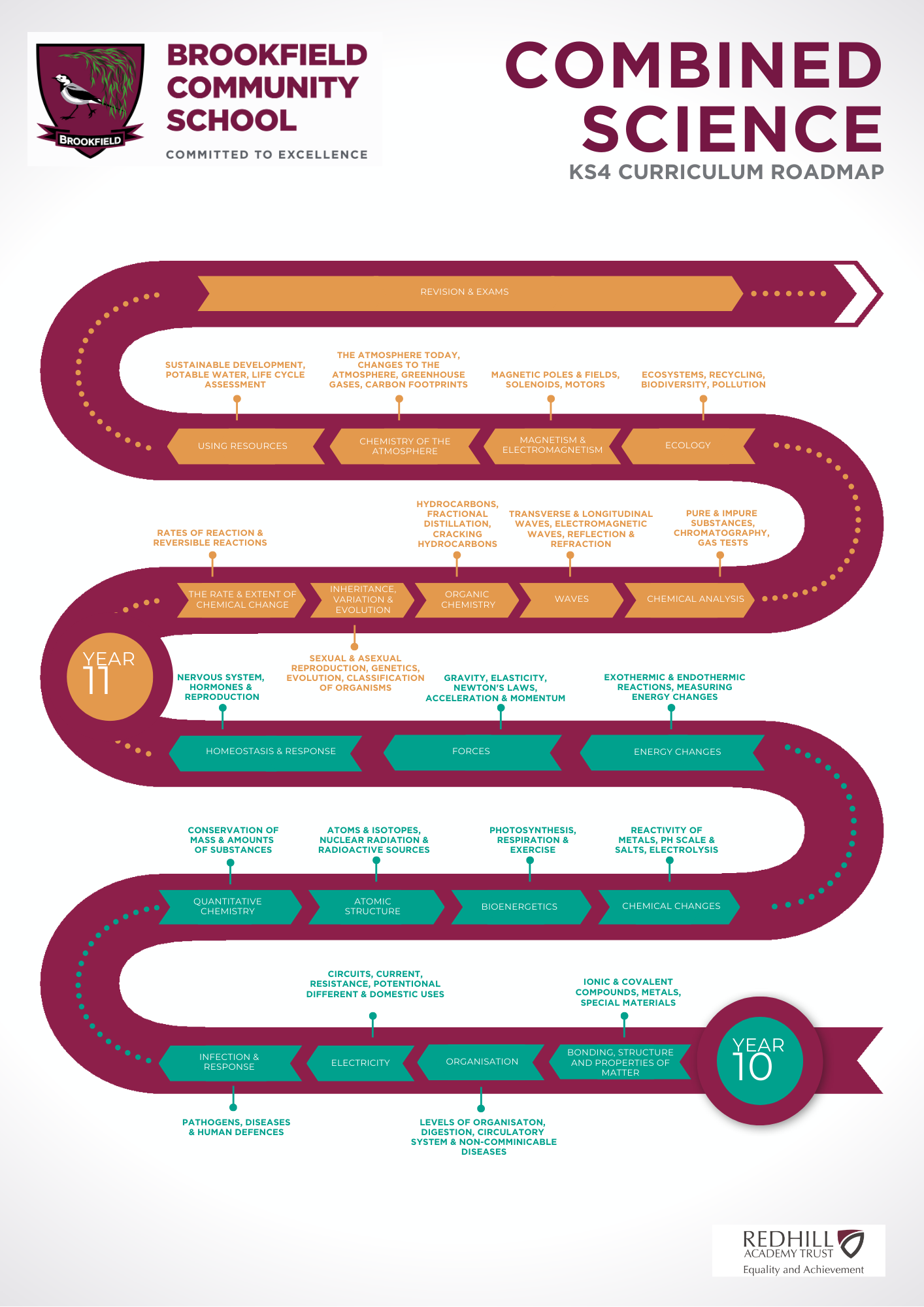
GCSE Biology
Exam Board: AQA
The Course
Teaching in Biology continues with the process of building upon and deepening scientific knowledge and the understanding of ideas developed in earlier key stages.
GCSE Biology is the study of living organisms and their structure, life-cycles, adaptations and environment.
The topics covered are;
- Experimental skills
- Cell biology
- Organisation
- Infection and response
- Bioenergetics
- Homeostasis and response
- Inheritance, variation and evolution
- Ecology
How are students assessed?
There are two exam papers. All the exam papers are 1 hour and 45 min long and account for 50% of the final mark. Questions can be multiple choice, structured, closed short answer, and open response.
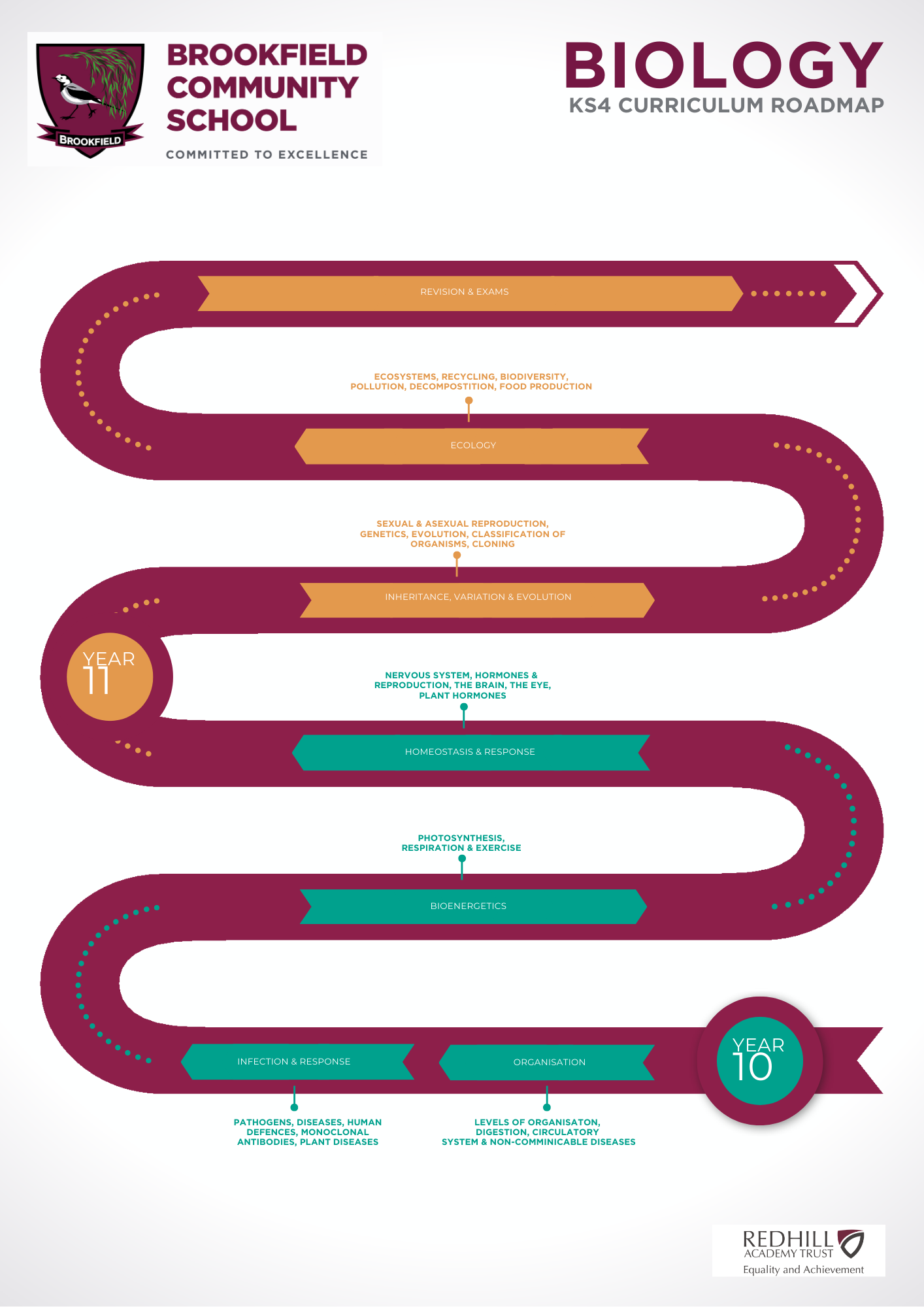
GCSE Chemistry
Exam Board: AQA
The Course
Teaching in Chemistry continues with the process of building upon and deepening scientific knowledge and the understanding of ideas developed in earlier key stages.
Chemistry is the study of the composition, behaviour and properties of matter, and of the elements of the Earth and its atmosphere.
The topics covered are;
- Experimental skills
- Atomic structure and the periodic table
- Bonding, structure, and the properties of matter
- Quantitative chemistry
- Chemical changes
- Energy changes
- The rate and extent of chemical change
- Organic chemistry
- Chemical analysis
- Chemistry of the atmosphere
- Using resources
How are students assessed?
There are two exam papers. All the exam papers are 1 hour and 45 min long and account for 50% of the final mark. Questions can be multiple choice, structured, closed short answer, and open response.
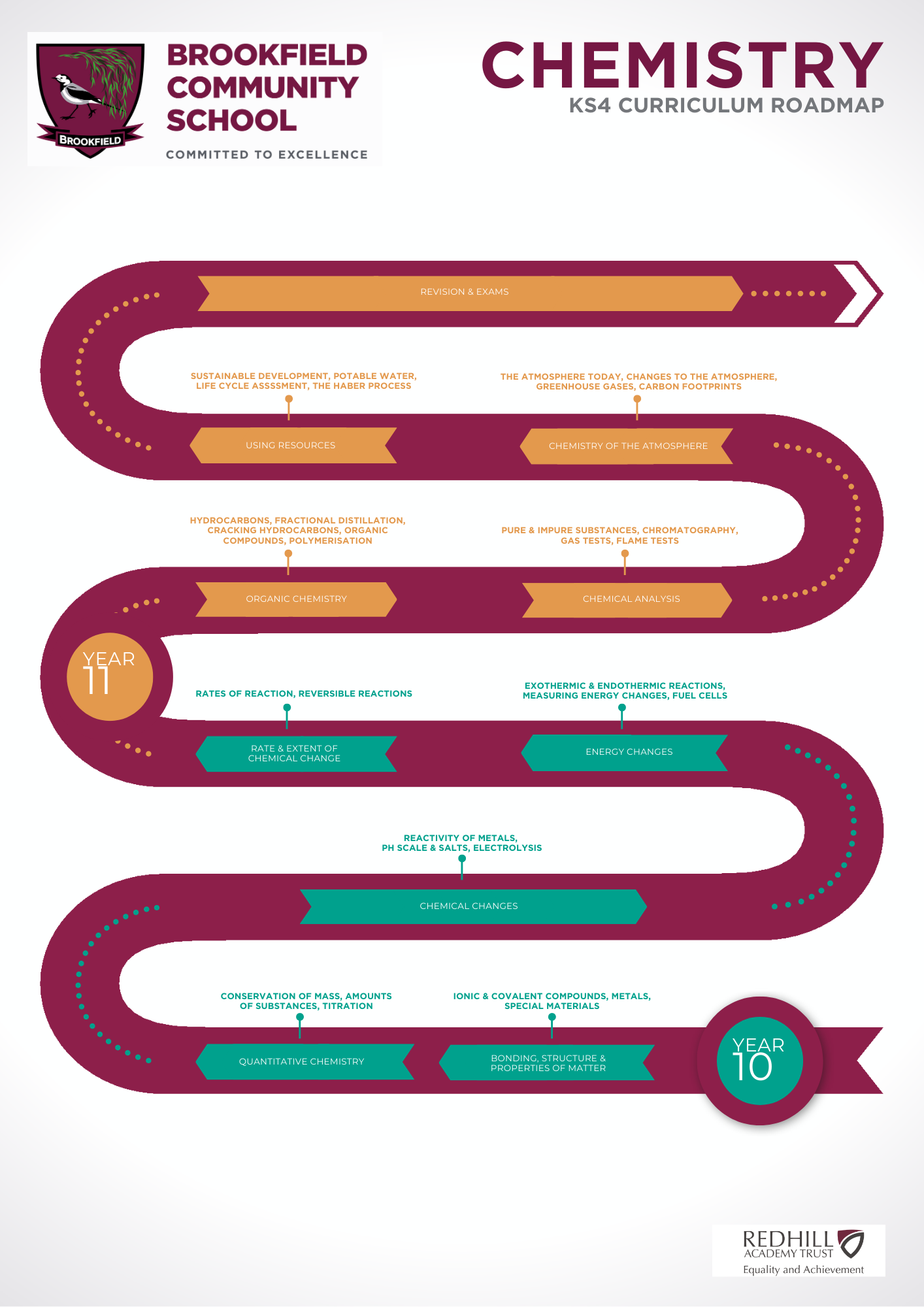
GCSE Physics
Exam Board: AQA
The Course
Teaching in Physics continues with the process of building upon and deepening scientific knowledge and the understanding of ideas developed in earlier key stages.
Physics is the study of energy, forces, mechanics, waves, and the structure of atoms and the physical universe.
The topics covered are;
- Experimental skills
- Energy
- Electricity
- Particle model of matter
- Atomic structure
- Forces
- Waves
- Magnetism and electromagnetism
- Space physics
How are students assessed?
There are two exam papers. All the exam papers are 1 hour and 45 min long and account for 50% of the final mark. Questions can be multiple choice, structured, closed short answer, and open response.
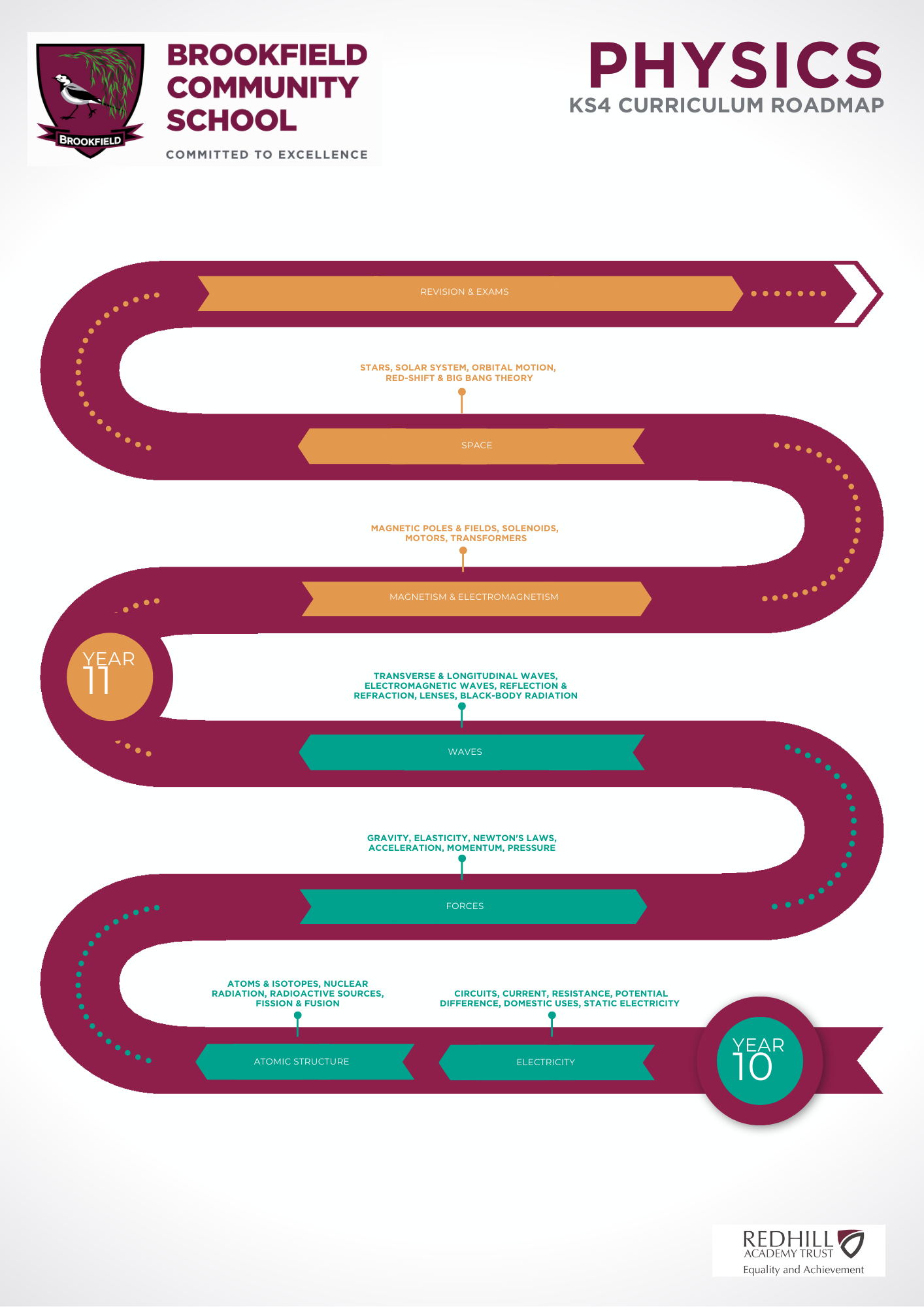
Key Stage 5
A Level Biology
Exam Board: AQA
The Course
Biology is the study of living things, but not just animals and plants. Students learn about the molecules that make living things work, the cells that they’re made from, the systems within plants and animals, and the interconnections between organisms. Biology is different from physics and chemistry, in that living things don’t always do what you expect them to do. You can’t test one organism and assume all the rest will be the same, so students learn about the statistical analysis behind making claims. Biology A Level will gives students the skills to make connections and associations with all living things around them.
Biology literally means the study of life - and if that’s not important, what is? Being such a broad topic, students are bound to find a specific area of interest, plus it opens the door to a fantastic range of interesting careers.
The AQA Biology A Level is split into 8 topics:
- Biological molecules
- Cells
- Organisms exchange substances with their environment
- Genetic information, variation and relationships between organisms
- Energy transfer in and between organisms
- Organisms respond to change in their internal and external environments
- Genetics, populations, evolution and ecosystems
- The control of gene expression
Plus Experimental skills
How are students assessed?
There are three exam papers. All the exam papers are 2 hours long.
Paper 1 – 35% of the marks for the full A Level. 76 marks: a mixture of short and long answer questions and 15 marks: extended response questions. This paper examines topics 1-4.
Paper 2 – 35% of the marks for the full A Level. 76 marks: a mixture of short and long answer questions and 15 marks: comprehension question. This paper examines topics 5-8.
Paper 3 – 30% of the marks for the full A Level. 38 marks: structured questions, including practical techniques, 15 marks: critical analysis of given experimental data and 25 marks: one essay from a choice of two titles. This paper examines all topics 1-8.
Separate to the above exam papers which determine the students A Level grade the students can also achieve a practical skills endorsement. This is achieved by students developing their experimental skills throughout the A Level course and building up a bank of practical skills and expertise.
A Level Chemistry
Exam Board: AQA
The Course
A Level Chemistry attempts to answer the big question “what is the world made of?” and it’s the search for this answer that makes this subject so fascinating. From investigating how one substance can be changed drastically into another, to researching a new wonder drug to save millions of lives, the opportunities that chemistry provides are endless.
Any qualification in Chemistry comes with implicit understanding that the holder has not only specialised knowledge but a broad set of transferable key skills that can prove invaluable in further study or employment.
The course is separated into three key areas – Physical Chemistry, Inorganic Chemistry and Organic Chemistry. Within these three strands, students will both develop a deeper understanding of some familiar topics and build new knowledge around fresh topics such as isomerism, NMR analysis, periodicity, electrochemistry and thermodynamics.
The topics covered are;
- Experimental skills
- Physical chemistry
- Inorganic chemistry
- Organic chemistry
How are students assessed?
There are three exam papers. All the exam papers are 2 hours long.
Paper 1 – 35% of the marks for the full A Level. 105 marks of short and long answer questions.
Paper 2 – 35% of the marks for the full A Level. 105 marks of short and long answer questions.
Paper 3 – 30% of the marks for the full A Level. 40 marks of questions on practical techniques and data analysis, 20 marks of questions testing across the specification and 30 marks of multiple choice questions.
Separate to the above exam papers which determine the students A Level grade the students can also achieve a practical skills endorsement. This is achieved by students developing their experimental skills throughout the A Level course and building up a bank of practical skills and expertise.
A Level Physics
Exam Board: AQA
The Course
Students will already be familiar with many of the topics that they will study, including forces, waves, radioactivity, electricity and magnetism. At A Level, they will look at these areas in more detail and find out how they are interconnected. They will also learn how to apply maths to real world problems and explore new areas such as particle physics and astrophysics.
Perhaps more importantly, they will develop skills that can be transferred to just about any other area of work, from setting up a business to saving the planet.
The topics covered are;
- Experimental skills
- Particles and radiation
- Waves
- Mechanics and materials
- Electricity
- Further mechanics and thermal physics
- Fields and their consequences
- Nuclear physics
- Astrophysics
How are students assessed?
There are three exam papers. All the exam papers are 2 hours long.
Paper 1 – 34% of the marks for the full A Level. 60 marks of short and long answer questions and 25 multiple choice questions.
Paper 2 – 34% of the marks for the full A Level. 60 marks of short and long answer questions and 25 multiple choice questions.
Paper 3 – 32% of the marks for the full A Level. 45 marks of short and long answer questions on practical experiments and data analysis. 35 marks of short and long answer questions on Astrophysics.
Separate to the above exam papers which determine the students A Level grade the students can also achieve a practical skills endorsement. This is achieved by students developing their experimental skills throughout the A Level course and building up a bank of practical skills and expertise.
Enrichment
To support the KS3 Science curriculum there are many opportunities to relate Science to the wider world. At Brookfield, we celebrate the National Science week by having many co-curricular activities going on such as a nature photography competition, fantastic demonstrations afternoon and ‘get hands on’ with Science session after school. There are also field work trips to Somersall park for Year 8, a competition with a local enterprise United Cast Bar for Year 7 and a Science BOC demonstration day for Year 9 students.
To support KS4 Science students we run a weekly after school drop-in session where students can access help and support with their GCSE Science work from science teachers,
In A Level Chemistry we have developed excellent links with local universities and this gives us the opportunity for our students to experience practical visits to University laboratories synthesising drugs such as Aspirin and Paracetamol and analysing these compounds with cutting edge instrumentation. We also take part in competitions such as the Chemistry Olympiad and Schools Analyst of the Year through our affiliation with the Royal Society of Chemistry. We are always looking for opportunities to bring our school learning into a real-life context.
A Level Biologists are offered the opportunity to attend a 2-week trip to Mexico. During week 1, students take part in research fieldwork with Operation Wallacea. Students investigate the carbon content of the rainforest, estimate the value of the rainforest as a habitat versus land for development and conduct animal and plant surveys within the rainforest. The second week is spent in Akumal where students conduct marine coastline surveys to assess the quality of the habitat for local wildlife including turtles.
Y12 Biologists take part in a two-day fieldwork to investigate the effect of environmental factors on the distribution of different species in the local environment. We have also taken students to The University of Sheffield for the ‘Biologist for a Day’ programme in which students completed a typical day as a Biology undergraduate.
Progression Opportunities
Brief information on how the subject can support the students in the future, including further education and careers.
Biology
Many people use an A-Level in Biology in their future studies or work. Even if students don’t decide to work in biology, studying it still develops useful and transferable skills for other careers. Students will develop research, problem-solving and analytical skills, alongside teamwork and communication. Universities and business regard these very highly.
Here are some possible degrees options after studying A Level Biology:
Biology, Psychology, Sport and exercise science, Medicine, Anatomy, Physiology and pathology pharmacology, Toxicology and pharmacy chemistry. This list is by no means exhaustive. Biology can prove useful for a wide variety of degree courses.
Chemistry
It would be easy to list many jobs or careers in which a Chemistry qualification plays a vital role; Analytical chemist , Chemical engineer, Clinical biochemist, Pharmacologist, Doctor, Dentist, Vet, Research scientist (physical sciences), Toxicologist, Chartered certified accountant, Environmental consultant, the list could take many pages. Perhaps more importantly is the fact that our world is very much a material world and as such, every material or product involves some aspect of Chemistry and hence a job opportunity. There are many very surprising areas that a Chemist may find themselves working in. In addition to this, the skills developed are recognised across many non-scientific areas such as finance, advertising, planning, logistics and so on. A chemistry qualification really is a foot in many doors.
Physics
This can be one of the most important qualifications for a great many careers.
Studying physics can open the door to a variety of jobs. The jobs below give an indication of the sorts of jobs for which Physics may be an advantage.
Aeronautical Engineer, Agricultural Scientist, Air-Traffic Controller, Architect, Army, Astronomer, Audiologist, Automobile Engineer, Biomedical Engineer, Biophysicist, Building technologist, Civil Service, Scientific Officer, Computer-aided Design, Computer Programmer, Dental Technician, Dentist, Doctor, Draughts Person, Electrical Engineer, Electrician, Electronics Engineer, Environmental Health Officer, Ergonomicist, Flight Engineer, Forensic Scientist, Geophysicist, Health and Safety Officer, Industrial Designer, Information Scientist, Laboratory Technician, Lighting Technologist, Marine Scientist, Materials Scientist, Mechanical engineer, Medical Physicist, Metallurgist, Engineer and Radio Officer, Meteorologist, Mining engineer, Motor Mechanic, Nuclear Scientist, Optician, Patent agent, Physicist, Physiotherapist, Pilot, Production Engineer, Quantity Surveyor, Radiographer, Radio Station Manager, Recording engineer, Royal Air Force, Royal Navy, Space Scientist, Structural engineer, Systems analyst, Teacher.


